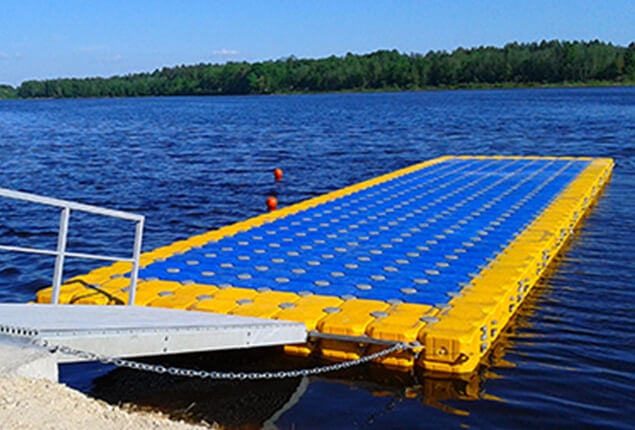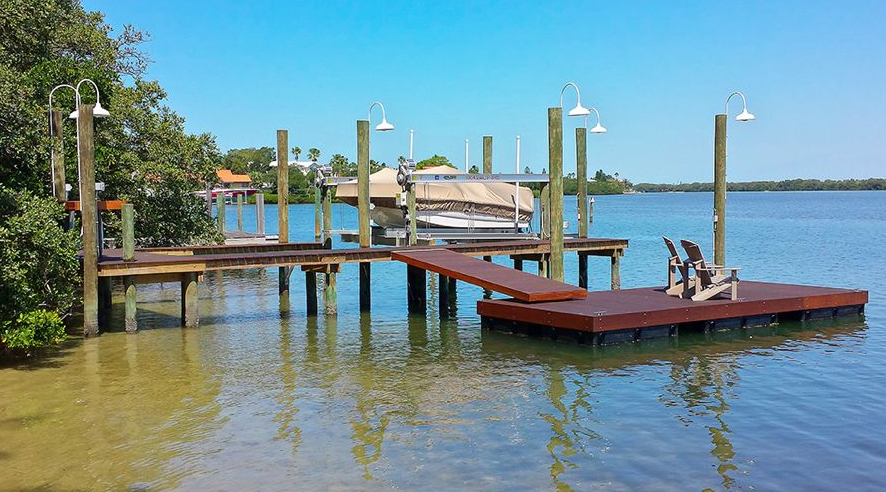Locate the Perfect Floating Dock Builder to Bring Your Waterside Vision to Life
Locate the Perfect Floating Dock Builder to Bring Your Waterside Vision to Life
Blog Article
Floating Docks: The Suitable Choice for Versatile Water Accessibility
Floating docks existing an engaging remedy for a selection of water access needs, using adaptability that goes beyond conventional mooring choices. Their capability to adjust to rising and falling water levels while ensuring security and safety makes them particularly advantageous for both business and recreational applications. In addition, the modular nature of floating docks helps with customization, satisfying specific demands. However, the subtleties of installment and maintenance, along with the range of applications, warrant a closer examination to completely appreciate their potential advantages and effects for waterway access methods.
Advantages of Floating Docks
Floating docks deal various advantages that boost water gain access to for numerous applications. Their capacity to drop and increase with altering water levels makes them specifically beneficial in settings with varying tides or seasonal variations. This versatility makes sure that vessels can conveniently moor without concern for the water's deepness, supplying a reliable system for recreational, industrial, and commercial usages.
Furthermore, floating docks are frequently created from long lasting products that resist deterioration, making them ideal for long-lasting usage in aquatic environments. Their installment is generally much less intrusive than conventional fixed docks, reducing the environmental impact and assisting in quicker implementation (floating dock company). This flexibility enables less complicated moving or reconfiguration according to user demands or environmental modifications
Safety and security is one more vital benefit; floating docks can offer secure gain access to for people boarding or getting off from boats and reduce the threat of mishaps related to unstable surfaces. They can be developed to fit a range of devices, such as fenders and cleats, improving capability. Overall, floating docks stand for an effective solution for improving water access throughout diverse industries while advertising security and environmental sustainability.

Kinds Of Floating Docks
Various sorts of floating docks cater to different demands and settings, each made with details functions to maximize capability. One of the most typical kinds consist of modular docks, which contain interlocking areas that allow for simple modification and growth. These docks are perfect for entertainment use, as they can be tailored to fit different watercraft sizes and water conditions.
One more preferred option is the fixed floating dock, which stays secured in position but floats with altering water degrees. floating dock services. This type is particularly suited for locations with marginal tidal variations, offering steady gain access to for angling or swimming. In addition, there are drive-on docks, which include a sloped layout that permits watercrafts to conveniently drive on and off, making them suitable for personal watercraft and smaller vessels
For business applications, sturdy floating docks are offered, built from enhanced materials to hold up against considerable loads and rough aquatic settings. Finally, eco-friendly floating docks make use of sustainable products and designs to lessen environmental effect, typically integrating functions like greenery to support neighborhood wild animals. Comprehending you could try these out the different kinds of floating docks ensures that customers can select one of the most proper service for their specific needs.
Setup Process Review
An effective installation of floating docks calls for careful preparation and interest to information to make sure optimal efficiency and safety. The first step entails examining the site problems, consisting of water depth, existing, and prospective barriers. This assessment educates the selection of the ideal dock products and style customized to the particular setting.
Next, acquiring essential licenses is essential, as lots of territories have policies pertaining to building on water bodies. As soon as authorizations are secured, the installment can proceed. Begin by preparing the foundation, which may include anchoring systems or pilings tailored to the dock type and neighborhood problems.
Following the foundation arrangement, construct the dock sections according to supplier requirements. Ensure that all elements are safely attached and straightened to withstand ecological stresses. Position the dock in the assigned area, guaranteeing it is degree and secure.

Upkeep Tips and Ideal Practices
After the setup process is complete, recurring upkeep plays an essential function in guaranteeing the longevity and capability of floating docks. Normal examinations need to be performed to determine any indicators of damages, wear, or deterioration - floating dock services. Look for any kind of loosened fittings, splits, or splitting up in the dock areas, as these can jeopardize structural stability
Cleaning the dock is vital to get rid of debris, algae, and various other build-up that can affect its appearance and safety. Use a gentle stress wash occasionally to preserve sanitation without triggering damages to the surface. Furthermore, applying a safety sealer every couple of years can aid improve long life and resist environmental wear.
Pay focus to the mooring lines and supports, ensuring they are safe and secure and totally free from click here to find out more rust. Change any degraded parts promptly to prevent threats. Seasonal adjustments may likewise be essential; during extreme weather, strengthening the dock or rearranging can prevent damage.
Applications for Floating Docks
Floating docks serve a plethora of applications, satisfying both industrial and leisure demands. In entertainment setups, they give seamless access to waterways for activities such as boating, fishing, and swimming. Their adjustable nature permits setup in varying water levels, making certain stable and safe access no matter tidal fluctuations.
Commercially, floating docks are important for marinas and waterfront services. They help with the docking of vessels, allowing effective dumping and filling of items. Their modular layout permits simple growth or reconfiguration to accommodate changing service needs, making them suitable for watercraft leasings, trip operations, or angling charters.
In addition, floating docks are used in ecological applications such as water research and environment restoration. They can act as systems for scientific studies, monitoring water quality, or conducting wild animals surveys without disturbing delicate environments.
In industrial contexts, floating docks are utilized in construction tasks, supplying access to hard-to-reach locations for devices and personnel. Their convenience, sturdiness, and very little influence on the setting make them an ideal selection for a large range of applications, boosting both performance and ease of access in different water-based environments.
Final Thought
In conclusion, floating docks stand for an optimal option for diverse water gain access to needs, owing to their flexibility, sturdiness, and modular design. These frameworks facilitate risk-free mooring for numerous applications while reducing ecological influence during installment. The decreased upkeep requirements additionally enhance their explanation functionality. Floating docks offer as an important possession for entertainment, commercial, and environmental jobs, making certain reputable accessibility to rivers and advertising lasting practices in water atmospheres.
Floating docks existing an engaging remedy for a variety of water access needs, offering versatility that transcends traditional mooring alternatives.Floating docks offer various benefits that improve water gain access to for different applications. In general, floating docks stand for a reliable solution for boosting water accessibility throughout diverse industries while promoting safety and security and ecological sustainability.
One more preferred choice is the stationary floating dock, which remains secured in place but drifts with transforming water degrees.In final thought, floating docks stand for an optimal solution for varied water gain access to needs, owing to their flexibility, resilience, and modular design.
Report this page